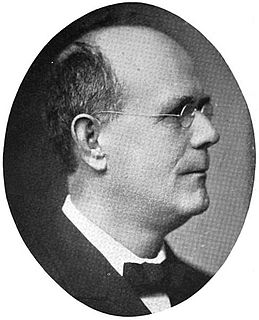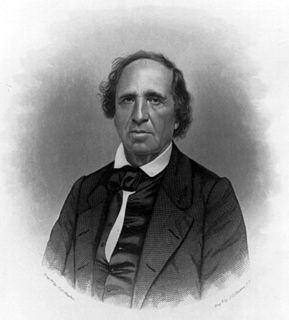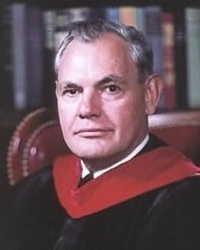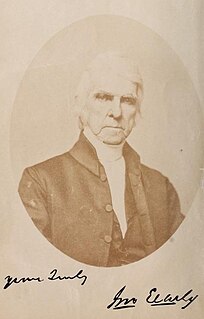
William Henry Willimon is an American theologian and bishop in the United Methodist Church, retired, who for eight years served the North Alabama Conference. He is Professor of the Practice of Christian Ministry and Director of the Doctor of Ministry program at Duke Divinity School. He is former Dean of the Chapel at Duke University and is considered by many as one of America's best-known and most influential preachers. A Pulpit & Pew Research on Pastoral Leadership survey determined that he was one of the two most frequently read writers by pastors in mainline Protestantism alongside the Roman Catholic writer Henri Nouwen. His books have sold over a million copies. He is also Editor-At-Large of The Christian Century. His 2019 memoir Accidental Preacher was released to wide acclaim, described by Justo L. Gonzalez as "An exceptional example of theology at its best."

Franklin Elmer Ellsworth Hamilton was an American bishop of the Methodist Episcopal Church, elected in 1916.

Elijah Embree Hoss, Sr was an American bishop of the Methodist Episcopal Church, South, elected in 1902. He also distinguished himself as a Methodist pastor, as a college professor and administrator, and as an editor.
Paul Elliott Martin was an American bishop of the Methodist Church and the United Methodist Church, elected in 1944. He also distinguished himself as a Methodist pastor and district superintendent, as well as by notable service to his denomination.
Costen Jordan Harrell was a bishop of The Methodist Church in the United States, elected in 1944.
Gregory Vaughn Palmer is an American Bishop of The United Methodist Church, elected in 2000. He was born and raised in Philadelphia, Pennsylvania. His father, Herbert Palmer, is also a United Methodist pastor.

Edwin Charles Boulton was an American Bishop of the United Methodist Church, elected in 1980.
Clare Purcell was an American Bishop of the Methodist Episcopal Church, South and the Methodist Church, elected in 1938.

James Osgood Andrew was elected in 1832 an American Bishop of the Methodist Episcopal Church. After the split within the church in 1844, he continued as a bishop in the Methodist Episcopal Church, South.
Earl Gladstone Hunt Jr. (1918–2005) was an American who distinguished himself as a Methodist Pastor and Evangelist, as the President of Emory and Henry College, as an author and theologian, as a Bishop of The Methodist Church and the United Methodist Church, and as a leader in World Methodism.

Fred Pierce Corson was an American bishop of The Methodist Church and the United Methodist Church, elected in 1944. He also distinguished himself as a Methodist pastor and district superintendent; as the twentieth president of Dickinson College, Carlisle, Pennsylvania; and as an ecumenical Christian leader.

Prince Albert Taylor Jr. was an American Bishop of The Methodist Church and the United Methodist Church, elected in 1956. When he died he held the distinction of the longest tenure of all living United Methodist Bishops at that time. Only one other Bishop remained from those elected in 1956: Bishop Ralph Edward Dodge. And as it happened, Bishop Dodge was but two days older than Bishop Taylor! No other Bishops elected before 1956 were alive in 2001. Bishop Taylor was also one of only three remaining African American Bishops elected by the Central Jurisdiction of The Methodist Church. The others were James Samuel Thomas and L. Scott Allen.

William Clyde Martin was a Bishop of the Methodist Episcopal Church South, The Methodist Church and the United Methodist Church. He distinguished himself in military service during World War I as a Methodist Pastor and held ecumenical ministries with the National Council of Churches and the World Council of Churches.
John Monroe Moore was a Bishop of the Methodist Episcopal Church, South, elected in 1918.
William Angie Smith was a Bishop of The Methodist Church and the United Methodist Church, elected in 1944.
William Turner Watkins was an American Bishop of the Methodist Episcopal Church, South (MECS) and of The Methodist Church, elected in 1938. He also distinguished himself as a Methodist Pastor, as a University Professor, and as an Editor.

John Early was instrumental in organizing the Methodist Episcopal Church, South, and was their bishop from 1854.
James Levert Davis is the 123rd elected and consecrated bishop in the African Methodist Episcopal (AME) Church. He was elected to the office of bishop at the 47th General Conference of the AME Church in 2004. He served as the presiding prelate of the 19th Episcopal district of the church comprising KwaZulu-Natal, Gauteng, Limpopo, Mpumalanga, North West and Free State in the Republic of South Africa. At the 48th General Conference of the AME Church in 2008 he was appointed the Presiding Prelate of the 9th Episcopal District, which comprises the State of Alabama.

George Carleton Lacy was an American Methodist missionary and the last Methodist Bishop in Mainland China.
Arthur Talmage Abernethy was a journalist, scholar, theologian and poet. He pastored several churches, contributed articles and poems to newspapers around the United States, and was named by Governor R. Gregg Cherry as the first North Carolina Poet Laureate in 1948.







